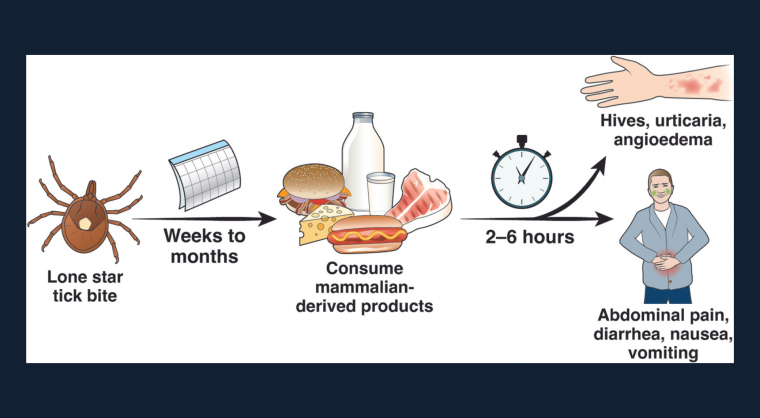Bethesda, MD (March 21, 2023) — The American Gastroenterological Association (AGA) has released new clinical guidance to help physicians and patients identify if unexplained digestive symptoms are due to alpha-gal syndrome, a food allergy that is caused by lone star tick bites. The AGA Clinical Practice Update was published today in Clinical Gastroenterology and Hepatology.
Alpha-gal syndrome is an allergy that causes your body to react to eating meat from mammals and products made from mammals. Symptoms usually start 2-6 hours after eating the mammalian meat or food.
Clinicians should consider alpha-gal syndrome in patients with unexplained gastrointestinal symptoms of abdominal pain, diarrhea, nausea and vomiting, particularly those who live or have lived in an alpha-gal–prevalent area (this includes the Southeast, mid-Atlantic, Midwest and East Central U.S. regions). For patients with suspected alpha-gal, there is a blood test that looks for immunoglobulin E antibodies (IgE) to alpha-gal. Patients with these antibodies may have alpha-gal allergy. The main treatment for alpha-gal allergy is to not eat foods that contain alpha-gal. This includes mammalian meat, fat and products made from them.
About Alpha-gal syndrome
Alpha-gal syndrome is an allergy that causes your body to respond badly to ingesting mammalian products; meat from mammals or products made from mammals such as cheese, butter, milk, cream, gelatin, etc. Mammals are animals that have hair, such as cows, pigs and deer. Symptoms usually start 2-6 hours after eating the mammalian meat or food. The alpha-gal allergy can cause symptoms of the gastrointestinal tract (digestive system) like stomach pain, diarrhea (loose stool), nausea or upset belly, and vomiting (throwing up). It can also cause hives (an itchy rash), flushing of the skin, swelling of the face, or fainting.
# # #
Media contact: Courtney Reed, media@gastro.org, 301-272-0025
About the AGA Institute
The American Gastroenterological Association is the trusted voice of the GI community. Founded in 1897, the AGA has grown to more than 16,000 members from around the globe who are involved in all aspects of the science, practice and advancement of gastroenterology. The AGA Institute administers the practice, research and educational programs of the organization. www.gastro.org.
AGA is now on Instagram.
Like AGA on Facebook.
Follow us on Twitter @AmerGastroAssn.
Check out our videos on YouTube.
Follow AGA on LinkedIn.
About Gastroenterology
Gastroenterology is the most prominent journal in the field of gastrointestinal disease. As the official journal of the AGA Institute, Gastroenterology delivers up-to-date and authoritative coverage of both basic and clinical gastroenterology. Regular features include articles by leading authorities and reports on the latest treatments for diseases. Original research is organized by clinical and basic-translational content, as well as by alimentary tract, liver, pancreas, and biliary content. www.gastrojournal.org













